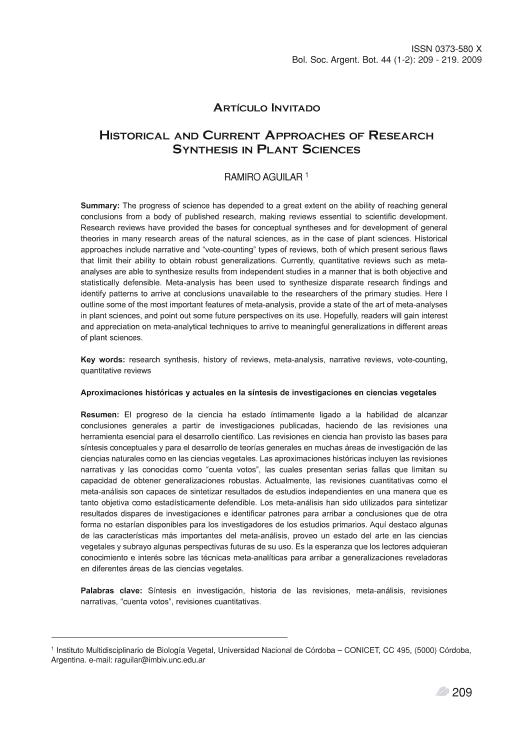Artículo
The progress of science has depended to a great extent on the ability of reaching general conclusions from a body of published research, making reviews essential to scientific development. Research reviews have provided the bases for conceptual syntheses and for development of general theories in many research areas of the natural sciences, as in the case of plant sciences. Historical approaches include narrative and "vote-counting" types of reviews, both of which present serious flaws that limit their ability to obtain robust generalizations. Currently, quantitative reviews such as metaanalyses are able to synthesize results from independent studies in a manner that is both objective and statistically defensible. Meta-analysis has been used to synthesize disparate research findings and identify patterns to arrive at conclusions unavailable to the researchers of the primary studies. Here I outline some of the most important features of meta-analysis, provide a state of the art of meta-analyses in plant sciences, and point out some future perspectives on its use. Hopefully, readers will gain interest and appreciation on meta-analytical techniques to arrive to meaningful generalizations in different areas of plant sciences. El progreso de la ciencia ha estado íntimamente ligado a la habilidad de alcanzar conclusiones generales a partir de investigaciones publicadas, haciendo de las revisiones una herramienta esencial para el desarrollo científico. Las revisiones en ciencia han provisto las bases para síntesis conceptuales y para el desarrollo de teorías generales en muchas áreas de investigación de las ciencias naturales como en las ciencias vegetales. Las aproximaciones históricas incluyen las revisiones narrativas y las conocidas como "cuenta votos", las cuales presentan serias fallas que limitan su capacidad de obtener generalizaciones robustas. Actualmente, las revisiones cuantitativas como el meta-análisis son capaces de sintetizar resultados de estudios independientes en una manera que es tanto objetiva como estadísticamente defendible. Los meta-análisis han sido utilizados para sintetizar resultados dispares de investigaciones e identificar patrones para arribar a conclusiones que de otra forma no estarían disponibles para los investigadores de los estudios primarios. Aquí destaco algunas de las características más importantes del meta-análisis, proveo un estado del arte en las ciencias vegetales y subrayo algunas perspectivas futuras de su uso. Es la esperanza que los lectores adquieran conocimiento e interés sobre las técnicas meta-analíticas para arribar a generalizaciones reveladoras en diferentes áreas de las ciencias vegetales.
Historical and current approaches of research synthesis in plant sciences
Título:
Aproximaciones históricas y actuales en la síntesis de investigaciones en ciencias vegetales
Fecha de publicación:
07/2009
Editorial:
Sociedad Argentina de Botánica
Revista:
Boletín de la Sociedad Argentina de Botánica
ISSN:
0373-580X
e-ISSN:
1851-2372
Idioma:
Inglés
Tipo de recurso:
Artículo publicado
Clasificación temática:
Resumen
Palabras clave:
Meta-Analysis
,
History of Reviews
,
Narrative Reviews
,
Quantitative Reviews
Archivos asociados
Licencia
Identificadores
Colecciones
Articulos(IMBIV)
Articulos de INST.MULTIDISCIPL.DE BIOLOGIA VEGETAL (P)
Articulos de INST.MULTIDISCIPL.DE BIOLOGIA VEGETAL (P)
Citación
Aguilar, Ramiro; Historical and current approaches of research synthesis in plant sciences; Sociedad Argentina de Botánica; Boletín de la Sociedad Argentina de Botánica; 44; 1-2; 7-2009; 209-219
Compartir




